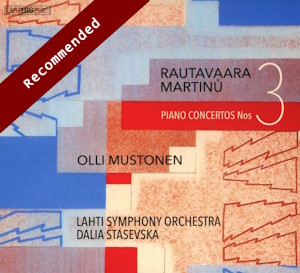
Einojuhani Rautavaara (1928-2016)
Piano Concerto No. 3 ‘Gift of Dreams’ (1998)
Bohuslav Martinů (1890-1959)
Piano Concerto No. 3 (1947-48)
Olli Mustonen (piano)
Lahti Symphony Orchestra/Dalia Stasevska
rec. 2022, Sibelius Hall, Lahti, Finland
BIS BIS-2532 SACD [56]
Rautavaara was the grand old man of Finnish music after Sibelius, who helped him in his youth, and he has also been well recorded, mostly by the Ondine label. He wrote three piano concertos, with many years separating each of them, and in them you can find a progression not unlike that in Bartók’s three piano concertos. The first is somewhat modernist and aggressive, the second less so and this third is mellifluous and charming. It was written for Vladimir Ashkenazy, who wanted a concerto which he could conduct as well as play, and that is what he did on his own recording. However, I tend to think that the work goes even better with a separate conductor, and that is what we have here.
By this time Rautavaara had settled into a neo-Romantic idiom which is both attractive in itself and also occasionally harks back to earlier composers. The first of the three movements opens meditatively with the piano entering with a gentle chordal theme – one thinks of Beethoven’s fourth piano concerto. The writing becomes more fluid but also delicate and here I thought of John Ireland’s concerto, a work I suspect Rautavaara did not know, but also that of Ravel, which he surely did. The central slow movement, much the longest, is a dialogue between piano and orchestra which becomes acrimonious before settling down again. It draws on a motif which the composer had used before and which is associated with the words ‘the gift of dreams,’ which give the concerto its title. The finale has a toccata-like opening which leads to another appearance of the dream motif and a big climax followed by silence.
Martinů’s concerto, the third of the five he wrote, was written at a difficult time for him, when he was recovering from an accident which temporarily incapacitated him as well as from other troubles in his personal life. It was written for Rudolf Firkušný, always a great champion of his music. Maybe the composer’s troubles left a mark on the work because the first two movements have a somewhat melancholy character, rather different from the usual exuberance I associate with his music. Otherwise, the work is characteristic late Martinů, with his long melodic lines, bouncy rhythms, pungent harmony and evocative atmosphere. The finale starts more cheerfully than the two previous movements but the atmosphere darkens and the piano arpeggios are quite menacing. This work really belongs with Martinů’s fiercer works, such as the Double Concerto, more than with his earlier concerto grosso-type works.
The performances are excellent. Olli Mustonen, whom we know as a composer and conductor as well as a pianist, shows himself wholy committed to these works. Dalia Stasevska, a new name to me, conducts both works idiomatically and the Lahti Symphony Orchestra responds with a will. The recording is up to the usual high standards of BIS and the booklet informative. The disc is presented in one of BIS’s new slimline folders which does not use plastic.
There is no other version of this coupling, though of course there are other versions of both works. Of the Rautavaara there is Ashkenazy’s own account, in which he both plays and conducts, which obviously has a certain authority, on a separate disc or in a convenient package of most of Rautavaara’s concertos (it missed the last two), both on Ondine (review). There is also a version by Laura Mikkola with Eri Klas conducting on Naxos, liked by Rob Barnett and John Phillips (review review). For Martinů there is the complete set by Emil Leichner with Jiří Bĕlohlávek conducting on Supraphon, but every Martinů fan should have the set of the middle three concertos by Rudolf Firkušný with Libor Pešek conducting on RCA (review). Still, as either a supplement or as an introduction to both composers this is well worth having.
Stephen Barber
Previous review: Leslie Wright (Recording of the Month – August 2023)
Help us financially by purchasing from




















